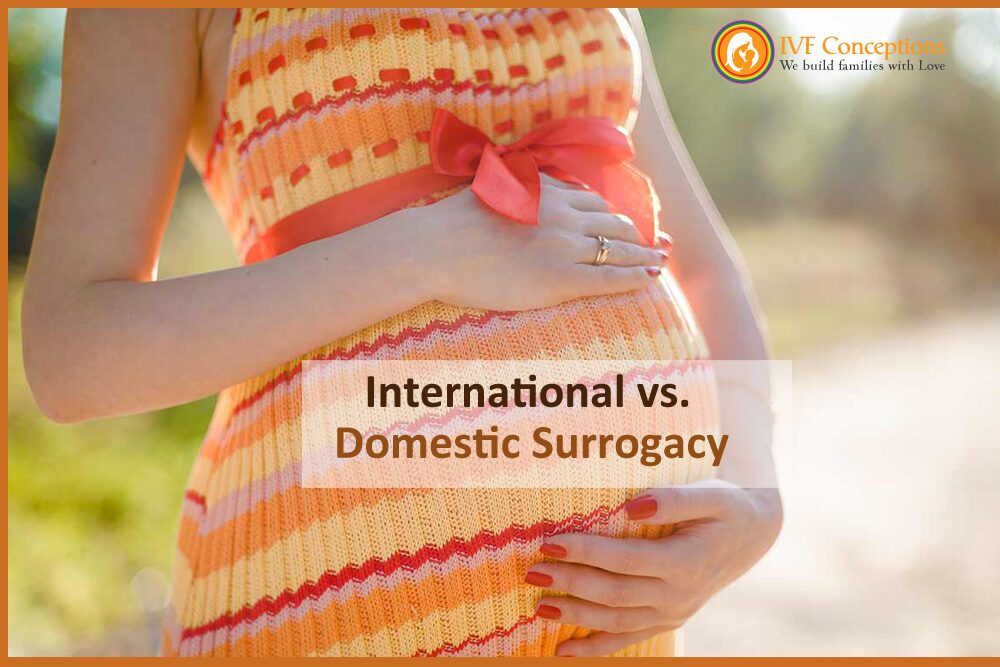International vs. Domestic Surrogacy

Are you looking into surrogacy to grow your family? Have you asked yourself, What are the main differences between international and domestic surrogacy? And which one suits your family best? This article will dive into the details of both choices. It’ll help you choose what’s best for your family, considering your aims, finances, and beliefs.
International vs. domestic surrogacy presents its own pros and cons. Going for international surrogacy might seem cheaper, but it brings challenges with being far away. This includes issues like harder communication and dealing with laws in another country. These can complicate the process of building your family. Yet, choosing domestic surrogacy in the U.S. offers a smoother, more regulated experience. It gives more comfort and involvement to the intended parents.
It’s key to grasp the details of each option, from the screening of surrogates to legal and ethical points. Weighing the cost, travel, and regulations is a vital step. This helps in making a choice that truly meets your family’s specific needs.
Key Takeaways
- International surrogacy may seem cheaper, which it is, but you need to consider the legal and medical aspects carefully before participating.
- Choosing domestic surrogacy in the U.S. offers a more organized, high-standard process, but international surrogacy is possible with the best countries for surrogacy where there are explicit laws and affordable surrogacy gives an advantage.
- Picking between international and domestic surrogacy depends on your priorities, budget, and ability to handle risks.
- Doing in-depth research and talking to surrogacy experts is crucial for a well-informed decision.
- Understanding what each path offers, including challenges and benefits, will guide you in selecting the right approach for your family’s journey.
Get in touch for a free consultation now!!
Mobile: +91-8800481100 ( WhatsApp, Line, Viber)
Email: neelam@ivfconceptions.com
Additional Resources for how much does surrogacy cost:
Everything You Need To Know (in 2023)
How Much Does Surrogacy Cost Using Family Member
Can My Insurance Provider Pay My Surrogacy Costs?
How Much Does Surrogacy Cost in the USA ( 2023)?
Surrogacy Costs Breakdown for Intended Parents
Understanding the Surrogacy Process
Surrogacy is pretty much the same everywhere you do it. But how much you’re involved can change, especially with international surrogacy. This is because surrogacy laws and standards are different in each country. In the U.S., finding a surrogate involves both you and the surrogate choosing each other. Yet, in other countries, the surrogate might not have a real say in picking the couple she works with.
If you can’t be there for every step of the international surrogacy process, trusting your surrogacy professional is crucial. This is difficult when you’re miles away. There can be worries about whether everything is being done right and legally.
Navigating Legal Complexities
When your child is born through international surrogacy, bringing them to the U.S. can get tricky. The ease or difficulty of this process depends on the country’s laws. You must closely work with your surrogacy team and the U.S. Department of State. They help you figure out the best way to protect both your rights and your child’s rights.
Bringing Your Child Home
Bringing your child from international surrogacy into the U.S. involves legal steps. The complexity varies based on the birth country’s laws. Working closely with your surrogacy team and the U.S. Department of State is essential. They will guide you in protecting your and your child’s rights efficiently.
Surrogacy Cost Considerations
American intended parents might look at international surrogacy to cut costs. It’s true that surrogacy is costly, wherever it happens. Yet, the price tag might be lower outside the U.S. This could mean fewer services or lower payment for the surrogate.
Potential Cost Savings with International Surrogacy

International surrogacy might seem cheaper for a few reasons. There might be less strict medical rules. Plus, there’s a chance the surrogate isn’t paid enough. But remember, lower cost can come with risks.
The price you pay for surrogacy links directly to the services you get. Working with a distant surrogate can add worries. Think about all factors, not just the cost, in international surrogacy.
Hidden Costs and Risks
International surrogacy’s reduced costs could spark your interest. Yet, lower prices often mean cutting corners. Again, remember that quality is tied to cost.
Having your baby overseas by a surrogate adds its own set of concerns. Make sure to consider all sides, not just the financial aspect.
Financing a Domestic Surrogacy
Surrogacy in the U.S. is pricier, but you get more service. Here, you can also find better peace of mind. With time to plan and proper funding, many can manage the costs.
Medical Standards and Procedures
When you do surrogacy in the U.S., you should make sure the professionals you work with follow the American Society for Reproductive Medicine’s (ASRM) rules. They make sure all medical work is done right and safely. By choosing a professional who follows ASRM rules, you can trust that you and your baby will be safe.
But, if you look at surrogacy in other countries, it might not be as safe because they might not have the same rules or medical technology. This makes it harder to know if the medical process is safe. It’s especially challenging if you haven’t seen the medical facility before starting the surrogacy process.
Regulatory Bodies and Guidelines
In the U.S., the ASRM makes sure the surrogacy process is safe for everyone involved. They have strict guidelines that clinics and professionals must follow. But, in international surrogacy, these rules might not be as strong. It’s important to check if the clinics abroad have high standards like those in the U.S.
Embryo Transfer and Handling
Embryo transfer is a key part of surrogacy in the U.S. You and your clinic plan out this step carefully to keep your embryos safe. But, in international surrogacy, this could mean more travel or shipping of embryos. This comes with more risks, which is why doing surrogacy in the U.S. is safer for international cases.
Additional Guide:
Find a Surrogate Mother With or Without an Agency
In Which Country I Find Low-Cost Surrogate Mothers (in 2023)?
How can I Find a Surrogate Without Agency
What is the Age Limit for Surrogate Mothers
How Much Does Surrogacy Cost Using Family Member
How to Start the Gestational Surrogacy Process? A step-by-step guide for Beginners
How Much Does Surrogacy Cost? Everything You Need To Know
Surrogate Screening and Selection
 In the surrogacy process, picking the right surrogate mothers is key. American Surrogacy, for example, makes sure all surrogates are physically and mentally healthy. They must have no criminal record and must not feel forced to be a surrogate. This extensive process aims to protect all involved. International surrogacy experts, however, might not check as thoroughly. This is often because their fees are lower.
In the surrogacy process, picking the right surrogate mothers is key. American Surrogacy, for example, makes sure all surrogates are physically and mentally healthy. They must have no criminal record and must not feel forced to be a surrogate. This extensive process aims to protect all involved. International surrogacy experts, however, might not check as thoroughly. This is often because their fees are lower.
Domestic Surrogacy Screening Process
In domestic surrogacy, the process is tough. Prospective surrogates undergo extended interviews. Their living spaces are also checked. This is to ensure their choice is free and their environment is safe for a surrogate pregnancy.
International Surrogacy Screening Challenges
Sometimes, important aspects are overlooked, even if a surrogate seems healthy. Her home life and true intentions can be hidden. You see, sometimes women choose surrogacy out of desperation. They might not have other choices to help their families with surrogacy money.
Ethical Concerns of surrogacy
In the world of international surrogacy, ethics can be a challenge. It’s not always the fault of the surrogacy professional if the process is not as thorough. But, entrusting someone lightly screened with your child is risky. It brings up big ethical questions about helping those in less fortunate circumstances.
Legal and Ethical Considerations
In the U.S., surrogacy laws can differ from state to state. Yet, they are usually well-managed. Surrogacy professionals and lawyers know how to handle surrogacies here. Most states in the U.S. allow surrogacy. Even without strict laws, professionals set their own high standards. This ensures a safe surrogacy process.
The rules for international surrogacy are tougher now. This is because international surrogacy is getting more common among American intended parents. Governments in some countries are limiting or stopping surrogacy for foreigners.
Surrogacy Laws and Regulations
If surrogacy is not banned in the U.S., it can be a different story in other countries. For example, some places don’t allow compensated surrogacy. This means a surrogate can’t be paid to carry your child.
Altruistic vs. Compensated Surrogacy
Some places only let Americans do surrogacy if they find a surrogate who is a relative within that country. As there’s no worldwide regulation, things could change. We might see a new set of rules developed, similar to the Hague’s.
Intended Parent Rights
The world of surrogacy laws and ethics can be hard to navigate. But, it’s vital for intended parents to know their rights and the rules. This is true whether they choose domestic or international surrogacy. Talking to skilled surrogacy experts and lawyers is a key step. It helps guarantee a secure and ethical path to becoming a parent.
International vs. Domestic Surrogacy Cost
American parents may choose international surrogacy to save money. They believe it costs less. But, choosing based on cost alone brings more risks. The level of service often matches the price. So, international surrogacy might look less costly. This happens because it lacks some services found in domestic surrogacy. It’s also because the surrogate gets paid less, in countries with different laws. Sometimes, these laws don’t allow for any pay, causing more problems.
Why international surrogacy cost is affordable?
The cost of international surrogacy is often significantly lower compared to pursuing surrogacy in developed countries like the United States or the United Kingdom. This cost advantage is primarily due to several factors related to the lower costs of medical procedures, surrogate compensation, and the overall cost of living in the destination countries. However, it’s important to note that these reduced costs do not necessarily compromise the quality of surrogacy services.

One of the main reasons for the lower cost of international surrogacy is the reduced fees for medical procedures such as In Vitro Fertilization (IVF) and other fertility treatments. In many countries where international surrogacy is popular, the costs of these medical procedures can be a fraction of what they would be in Western nations, without sacrificing the quality of care or expertise.
Another significant factor contributing to the lower cost is the compensation provided to surrogate mothers. While surrogate compensation in countries like the United States can range from $25,000 to $50,000 or more, in many international surrogacy destinations, surrogate mothers are often compensated with amounts that are considered reasonable and ethical based on the local cost of living. This lower compensation does not necessarily reflect exploitation, as the surrogate’s living standards and quality of life may be comparable or even better than the average in their respective countries.
Moreover, the overall cost of living in many international surrogacy destinations is significantly lower than in developed nations. This translates to reduced expenses for intended parents, including accommodation, travel, and other associated costs during the surrogacy process. Despite the lower costs, reputable international surrogacy agencies and clinics maintain high standards of care, professionalism, and ethical practices, ensuring a quality experience for all parties involved.
Here are the key points on why international surrogacy costs are lower:
- Lower medical procedure fees:
- In Vitro Fertilization (IVF) and other fertility treatments are significantly less expensive in many international surrogacy destinations compared to developed countries.
- The reduced costs do not necessarily compromise the quality of medical care or expertise.
- Lower surrogate compensation:
- Surrogate mothers in international surrogacy destinations are often compensated with amounts that are considered reasonable and ethical based on the local cost of living.
- This lower compensation does not reflect exploitation, as the surrogate’s living standards and quality of life may be comparable or better than the average in their respective countries.
- Lower overall cost of living:
- Many international surrogacy destinations have a significantly lower cost of living compared to developed nations.
- This translates to reduced expenses for intended parents, including accommodation, travel, and other associated costs during the surrogacy process.
- Maintained quality and ethical standards:
- Reputable international surrogacy agencies and clinics maintain high standards of care, professionalism, and ethical practices.
- Intended parents can expect a quality experience for all parties involved, despite the lower costs.
- Importance of legal and ethical considerations:
- While cost savings are a significant factor, intended parents should carefully consider the legal and ethical frameworks governing surrogacy in the destination country.
- Proper due diligence, working with reputable agencies, and adhering to established best practices are crucial for a safe, ethical, and legally compliant surrogacy journey.
Cheapest countries for surrogacy:
| Country | Regulation & Organization | Who are allowed to participate | Surrogacy Cost | Legal Assurance |
| Colombia | Altruistic | Singles, gay couples, hetero couples | Affordable
$70,000 |
Reliable |
| Mexico | Altruistic | Singles, gay couples, hetero couples | Affordable
$70,000 to $80,000 |
Reliable |
| USA | Commercial | Singles, gay couples, hetero couples | Costly
$150,000+ |
Strong |
| Ukraine | Commercial | Hetero couples | Affordable
$60,000 |
Strong |
| Georgia | Commercial | Hetero couples | Affordable
$60,000 |
Strong
|
| Greece | Altruistic | Hetero couples and single women | Affordable
$80,000 |
Strong |
Best countries for Surrogacy- Mexico, Colombia, Georgia, Argentina, India

American intended parents face a big choice when considering surrogacy. They choose between their own country or a foreign one.
When looking for surrogacy abroad make sure to get in touch with the best surrogacy agencies or professionals who have years of experience and know who does the logistics of international surrogacy works.
Besides this, do your own research and make sure that the legal rights of the surrogacy baby are well protected.
Here are a few legal countries for surrogacy that are popular among the IPs:
| Country | Surrogate Compensation | Legal Status | Risks and Considerations |
| Mexico | Compensated | Surrogacy is legal but with restrictions | Limited oversight, potential exploitation concerns |
| Colombia | Altruistic | Surrogacy is legal with some regulations | Relatively new surrogacy market, legal complexities |
| Georgia | Compensated | Surrogacy is legal and well-regulated | Distance from the US, language and cultural barriers |
| Argentina | Altruistic (no compensation) | Surrogacy is legal but highly restricted | Lack of compensated surrogacy, limited options |
| India | Altruistic | Surrogacy is legal but with significant restrictions | Uncertain legal landscape, potential exploitation |
The international surrogacy scene keeps changing. Each country presents new opportunities and challenges. American parents must do their homework before choosing a destination. Knowing the local laws and risks is key to a successful surrogacy journey.
Information on countries and their surrogacy laws:
| Country | Commercial Surrogacy | Altruistic Surrogacy | Surrogacy Status |
| Australia | Prohibited | Allowed | Altruistic surrogacy is legal in all jurisdictions. Commercial surrogacy is a criminal offense. |
| Canada | Banned | Allowed | Only altruistic surrogacy is permitted. Compensation for gestational carriers is limited to approved expenses. |
| Colombia | Uncertain | Allowed | There are no clear rules, but altruistic surrogacy is performed and well tolerated. |
| Greece | Banned | Allowed | Heterosexual couples, single females allowed. |
| India | Prohibited | Allowed | Altruistic surrogacy is permitted for certain couples based on medical and age criteria. |
| Israel | Allowed | Allowed | Gestational surrogacy is legal under the Embryo Carrying Agreements Law. |
| Kenya | N/A | N/A | No legal regulations/laws for surrogacy in Kenya. |
| Mexico | Allowed | N/A | Surrogacy, along with ovum and sperm donation, has been legal since 1992. |
| New Zealand | N/A | Allowed | Altruistic surrogacy is legal. |
| Thailand | Banned | N/A | Commercial surrogacy is criminalized under the Medical Council Act. |
| Ukraine | Allowed | Allowed | Surrogacy and egg/sperm donation are legal and supported by liberal laws. |
| United Kingdom | N/A | Allowed | Surrogacy laws vary across different states/territories in the UK. |
| United States | Varies by state | Allowed | Surrogacy laws vary by state, some are surrogacy-friendly, while others restrict or penalize commercial surrogacy. |
Pros and cons of international vs domestic surrogacy
When you think about surrogacy, one big choice is whether to go local or global. Choosing has its good and tough parts. So, it’s important to think carefully.
In some places abroad, surrogacy can be much cheaper than in the U.S. This is the main appeal of international surrogacy. But, it might mean less rule-following, which could bring problems.
In global surrogacy, there might be less checking on the surrogates. This can worry some people. Plus, getting your baby back home can be tricky and uncertain. This can stress out the parents-to-be.
On the other hand, keeping it in the U.S. means dealing with a system that is well-known and safe. The rules are clear and protect everyone involved. It’s reassuring to know that. But, U.S. surrogacy is more expensive.
Deciding between international and domestic surrogacy is about what matters most: saving money, feeling safe, or knowing what happens at each step. Professionals in the field can guide you. They help you think about these important parts and make the best decision for your family.
Here are the pros and cons of international vs. domestic surrogacy in a table format:
| Aspect | International Surrogacy | Domestic Surrogacy |
| Cost | Pro: Generally lower costs for medical procedures, surrogate compensation, and overall expenses. | Con: Higher costs for medical procedures, surrogate compensation, legal fees, and other expenses. |
| Legal Framework | Con: Navigating complex international laws and regulations can be challenging. | Pro: Domestic laws and regulations are more straightforward and familiar. |
| Surrogate Availability | Pro: Wider pool of potential surrogates in some countries. | Con: Limited availability of surrogates in certain regions. |
| Travel and Logistics | Con: Requires international travel and coordination of logistics across borders. | Pro: No international travel required, easier logistics within the home country. |
| Cultural and Language Barriers | Con: Potential communication and cultural barriers with surrogates and medical professionals. | Pro: No significant cultural or language barriers within the home country. |
| Medical Standards | Potential Con: Medical standards and regulations may vary across countries. | Pro: Familiarity with domestic medical standards and regulations. |
| Legal Parentage | Potential Con: Establishing legal parentage can be complex in some countries. | Pro: Well-established legal processes for parentage in the home country. |
| Ethical Considerations | Potential Con: Exploitation concerns in countries with lax regulations. | Pro: Domestic surrogacy often has stronger ethical oversight and protections. |
| Support Systems | Con: Limited personal support systems and familiarity with the surrogate’s environment. | Pro: Access to personal support systems and familiarity with the surrogate’s environment. |
Conclusion
 Deciding between international and domestic surrogacy is not an easy choice. There are many factors to consider. International surrogacy might catch your eye because it costs less. But, it brings along big risks and unknowns, like legal troubles, medical checks, and ethical worries.
Deciding between international and domestic surrogacy is not an easy choice. There are many factors to consider. International surrogacy might catch your eye because it costs less. But, it brings along big risks and unknowns, like legal troubles, medical checks, and ethical worries.
On the other hand, choosing domestic surrogacy in the US means you get a more stable and clear system. This can help parents-to-be feel more at ease, even though it can be more expensive. Many parents find the safety and legal support of domestic surrogacy worth the extra money.
But at the end of the day, the choice is very personal and needs a lot of thought. Talking to surrogacy experts is crucial. Make sure you deeply understand what each option offers, and the possible problems, before deciding.
We have been assisting intended parents with international surrogacy services for a long time now, more than 14 years, and can safely help you navigate your surrogacy journey with one of our associate service providers.
Without experience, you can safely choose international surrogacy if you have a trusted and experienced team on your side to guide, support, and educate you.
If you’d like to learn more about IVF, Egg Donation, or surrogacy Consulting services globally, check out the rest of our website at IVF Conceptions. We offer legally secure and affordable surrogacy consulting services for FREE.
Our team has over 14 years of experience facilitating surrogacy arrangements, egg donation, and serving as an advocacy resource for infertile couples and LGBTQ individuals seeking to build families. Till now we have helped and supported thousands of the intended parents with their family-building journey, and we can help you as well. Happy to share the references from the past IPs if needed.
If you’d like to learn more about IVF, Egg Donation, or surrogacy services globally, check out the rest of our website at Complete Surrogacy. We offer legally secure and affordable surrogacy consulting services for FREE.
Mobile: +91-8800481100 ( WhatsApp, Line, Viber)
Email: neelam@ivfconceptions.com
Web: www.completesurrogacy.com
FAQ for International vs. Domestic Surrogacy:
 What are the key differences between international and domestic surrogacy?
What are the key differences between international and domestic surrogacy?
International surrogacy makes communication harder due to distance. It also involves more legal steps. For example, you must consider bringing your child born abroad back to your home country.
How does the surrogacy process differ between international and domestic options?
In the U.S., finding a surrogate is a mutual effort. Internationally, you might not get a chance to choose. This means the process might feel less involved.
What are the challenges of bringing a child born through international surrogacy back to the U.S.?
Bringing a child to the U.S. from abroad can be tricky. It depends on the laws where they were born. You need to work with experts to ensure everything goes smoothly.
Why is international surrogacy sometimes considered a “cheaper” option?
International surrogacy might cost less due to fewer medical checks and different pay rates for surrogates. However, this can also mean more risks.
What are the potential risks of the medical process in international surrogacy?
Medical care in other countries might not be as advanced as in the U.S. Not all places follow strict oversight. This can lead to uncertainty about the care you and your surrogate receive.
How does the surrogate screening process differ between domestic and international surrogacy?
In the U.S., surrogates undergo thorough screenings. This ensures their health and motivation to help. Internationally, these checks might not be as detailed, especially if costs are lower.
How do surrogacy laws differ between countries?
U.S. surrogacy laws are well established, but laws for international surrogacy can vary greatly. This is because countries worldwide are now responding to the practice in different ways.
What are the potential ethical concerns with international surrogacy?
Some places allow only unpaid surrogacy. There are worries about how surrogates are treated, especially in poorer nations where money plays a big role.
Source Links

